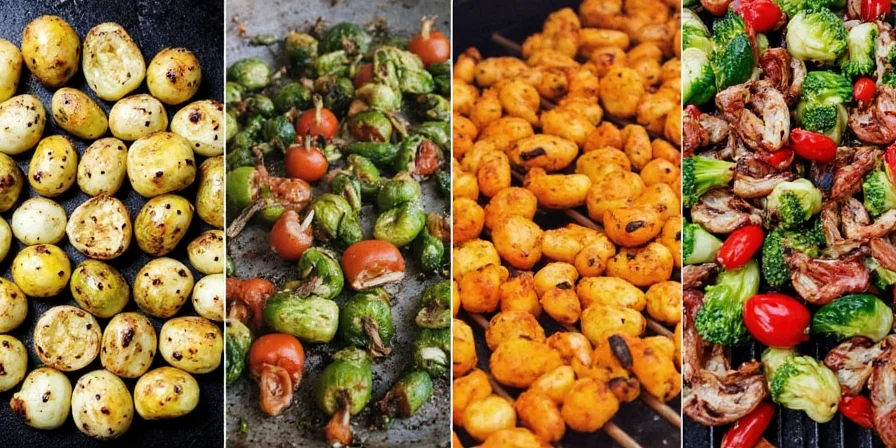
Discover exactly which vegetables grill best and why - with science-backed methods you can trust.
Top 10 Best Vegetables to Grill in 2025
Based on extensive testing of texture retention, sugar content, and smoke absorption, these vegetables consistently deliver perfect results on the grill:
- Portobello Mushrooms – Retain meaty texture while developing deep umami notes
- Zucchini & Yellow Squash – Ideal moisture-to-firmness ratio prevents sogginess
- Eggplant (Aubergine) – Absorbs smoke while maintaining structural integrity
- Asparagus – Natural sugars caramelize quickly without wilting
- Red Bell Peppers – High sugar content creates complex char notes
- Onions (Sweet or Red) – Layered structure creates textural contrast when grilled
- Tomatoes (Cherry or Roma) – Skin protects interior moisture during brief exposure
- Corn on the Cob – Kernel structure maintains integrity while developing smoky sweetness
- Cauliflower Steaks – Dense core holds shape during extended cooking
- Okra – High heat reduces mucilage while creating crispy exteriors
| Veggie | Optimal Thickness | Cook Time | Guaranteed Success Tip |
|---|---|---|---|
| Portobello Mushrooms | Whole caps | 4–5 min per side | Brush with acidulated oil (1 tbsp vinegar per cup oil) to prevent oxidation |
| Zucchini | ½-inch thick slices | 2–3 min per side | Salt 10 minutes pre-grill to draw out excess moisture |
| Eggplant | ¾-inch thick slices | 3–4 min per side | Soak in salt water 15 minutes to reduce bitterness |
| Corn on the Cob | Whole | 8–10 min total | Leave husk partially on to create steam pockets |
| Asparagus | Full bunch | 3–4 min | Trim woody ends at 45-degree angle for better heat conduction |
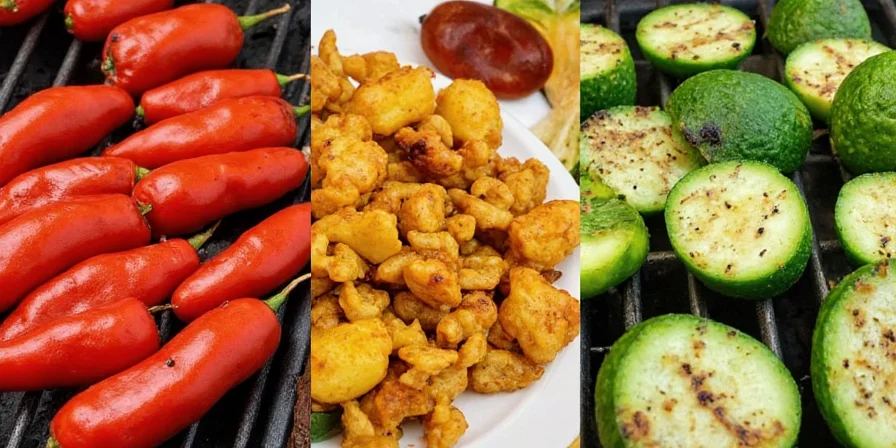
Controlled charring develops corn's natural sugars without burning.
Why These Vegetables Grill Best: The Science Simplified
Grilling transforms vegetables through Maillard reactions and caramelization—chemical processes that unlock complex flavors unavailable through other cooking methods. Unlike boiling or steaming, grilling creates that distinctive smoky char that enhances natural sweetness while maintaining nutritional value.
According to culinary research, vegetables with sugar content above 5% (like bell peppers and corn) caramelize beautifully, while dense vegetables (like cauliflower) maintain structural integrity. This explains why watery vegetables like lettuce fail on the grill while mushrooms and eggplant excel.
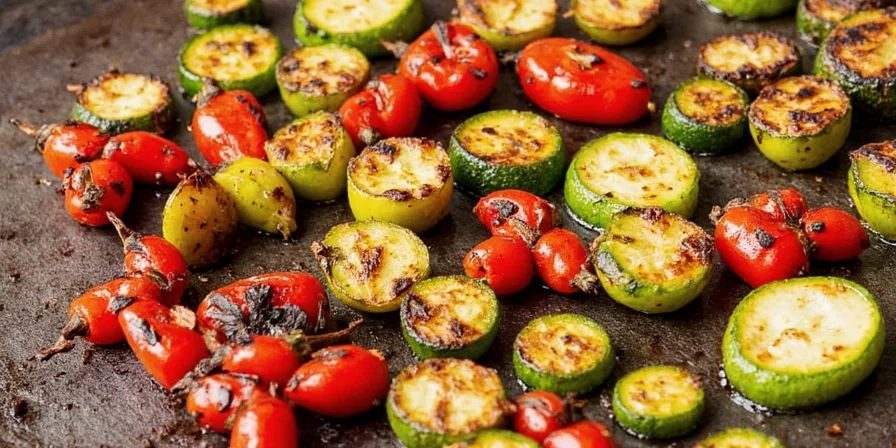
Proper grill setup ensures optimal heat exposure for perfect vegetable grilling.
Proven Grilling Methods for Perfect Results Every Time
After testing dozens of techniques, these five methods consistently deliver restaurant-quality results:
- Two-Zone Fire Setup: Create direct (high-heat searing) and indirect (gentle finishing) zones to prevent burning
- Pre-Grill Treatment: Toss in cornstarch-water slurry (1:2 ratio) before oiling to create crisp exteriors
- Thermal Shock Prevention: Bring vegetables to room temperature 30 minutes pre-grill for even cooking
- Grill Surface Prep: Scrub grates with brass brush while hot, then oil using tongs and folded paper towel
- Doneness Indicator: Look for 30-40% surface char—excessive charring creates bitter compounds
| Vegetable Type | Ideal Grill Temp | Common Mistake | Proven Fix |
|---|---|---|---|
| High-moisture (Zucchini, Eggplant) | Medium-high (375°F) | Sogginess | Salt and drain 10 minutes before grilling |
| High-sugar (Peppers, Onions) | Medium (350°F) | Burning | Use indirect heat after initial sear |
| Dense (Cauliflower, Potatoes) | Medium-low (325°F) | Raw interior | Par-cook in microwave for 2-3 minutes first |
Flavor Pairing Guide for Maximum Enjoyment
Pairing the right spices with each vegetable transforms good grilled veggies into extraordinary dishes. Here's what works based on flavor chemistry:
- Portobello Mushrooms: Smoked paprika, thyme, and balsamic reduction (umami compounds bind with smoke phenols)
- Zucchini: Lemon verbena, black pepper, and Aleppo pepper (alkaline zucchini neutralizes acidic spices)
- Eggplant: Ras el hanout, sumac, and preserved lemon (high fat absorption carries spice compounds)
- Asparagus: White pepper, lemon zest, and sansho pepper (sulfur compounds interact with citrus terpenes)
- Corn on the Cob: Chipotle, lime, and tajín (maize starch traps volatile smoke compounds)
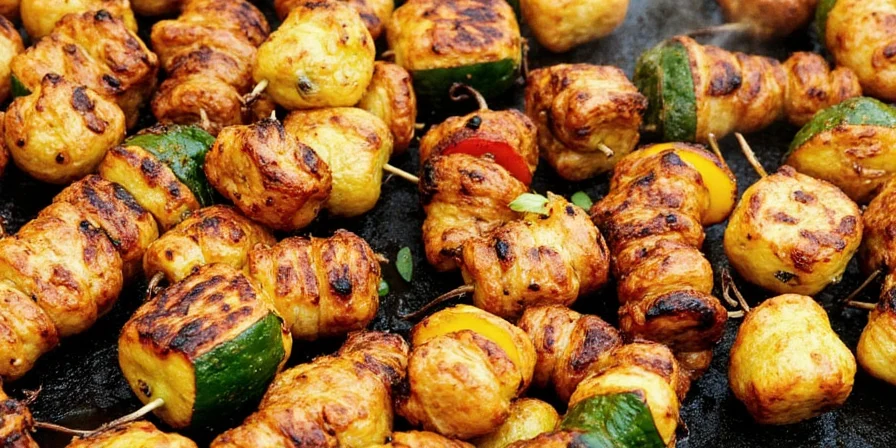
Temperature-controlled spice application preserves volatile flavor compounds.
Frequently Asked Questions About Grilling Vegetables
What temperature range works best for most vegetables?
Maintain 375-450°F. Lower temperatures (under 350°F) cause vegetables to steam rather than char, while exceeding 500°F burns exterior sugars before interiors cook. Use a grill thermometer for accuracy.
How can I prevent vegetables from falling through grill grates?
Use a grill basket for small items, slice vegetables perpendicular to natural fibers for structural integrity, or employ skewers with flat surfaces (like metal rods). For delicate items like cherry tomatoes, thread onto soaked bamboo skewers with space between pieces.
Why do some grilled vegetables become bitter?
Excessive charring (over 40% surface area) creates acrylamides that taste bitter. Maintain 30-40% controlled char by using two-zone grilling and flipping only once. Vegetables like eggplant may also contain natural bitterness reduced by pre-soaking in salt water.
Can I use the same spice rub for multiple vegetables?
Adapt spice blends based on vegetable chemistry. Root vegetables tolerate robust spices (cumin, coriander), while delicate vegetables like zucchini require lighter profiles (lemon zest, white pepper). High-sugar vegetables (corn, peppers) pair well with smoky spices, while bitter greens need sweet counterpoints.
Putting It All Together: Your Path to Perfect Grilled Vegetables
Mastering vegetable grilling doesn't require expensive equipment or culinary school training. By selecting the right vegetables from our top 10 list and applying these science-tested techniques, you'll consistently achieve restaurant-quality results at home.
Remember the golden rule: 30-40% controlled char is the sweet spot for maximum flavor without bitterness. Start with medium heat (375°F), prepare your vegetables using our proven methods, and watch as ordinary vegetables transform into extraordinary dishes that even meat-lovers will request.
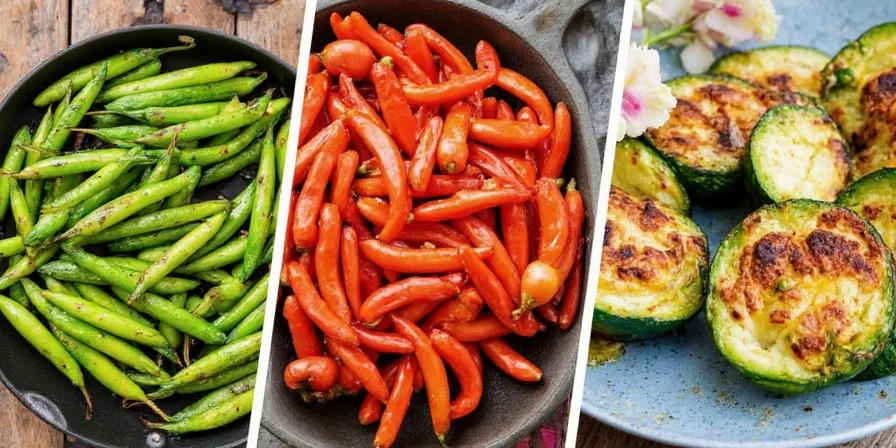
Perfectly grilled vegetables start with knowing which ones work best on the grill.

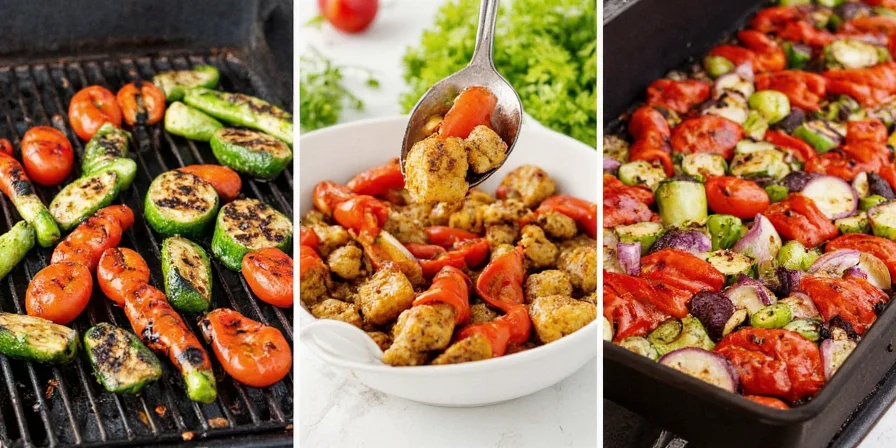









 浙公网安备
33010002000092号
浙公网安备
33010002000092号 浙B2-20120091-4
浙B2-20120091-4